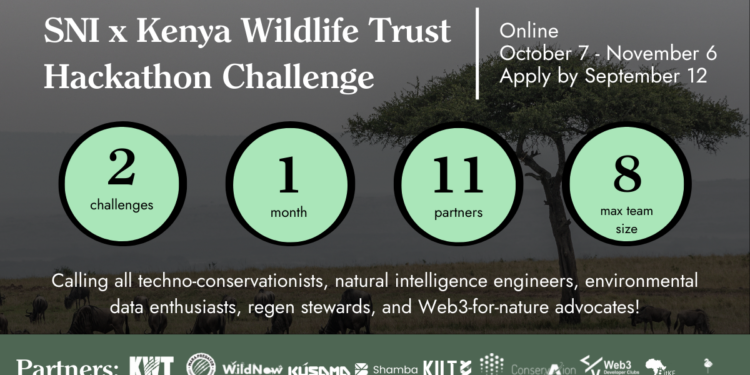NAIROBI, KENYA – August 16, 2022 – This October and November, the Sovereign Nature Initiative (SNI), a recognized as a leading node in the eco-web3 ecosystem, will host an online hackathon featuring teams building tech in service to the balance and thriving of life on earth, with a specific focus on predator conservation efforts in Kenya.
SNI will partner with the innovative NGO Kenya Wildlife Trust (KWT), an organisation committed to the protection and conservation of predators and their ecology, situated in the Maasai Mara National park in southwestern Kenya. This virtual competition, to be held in SNI’s metaverse, will expand on the success of their second hackathon held earlier this year, which focused on ecological challenges and opportunities at De Ceuvel, an eco-architectural sustainability park in Amsterdam, where SNI’s Experimental Zone #1 event was held in May.
During the SNI x Kenya Wildlife Trust Hackathon, selected teams from the region as well as around the world will develop technology solutions to help KWT identify wildlife through computer vision models, and onboard these identities using web3 data and self-sovereign identity protocols such as KILT Protocol. SNI will encourage teams to use web3’s distinct coordination-enabling abilities to tackle conservation challenges in communications and data integration.
Hackathon Judges
Confirmed judges include Irene Amoke, Executive Director – KWT, Catherine Bischoff, CEO – SNI, Memo Some, Founder and CEO – Wildnow Foundation, and Craig Beech, Executive Director – Regenerative SPACE. This hackathon also offers a coin prize: 320 Kusama tokens and 15,000 Ocean tokens, plus 5,000 euros bounty as a reward for winning teams’ innovation and creativity.
“First and foremost, this hackathon is an incredible opportunity to grow our community to include East African teams passionate about building tech in service to non-human life. It will also give SNI the chance to test how web3 technology and existing conservation tools can work together to support complex challenges faced by leading wildlife conservancies. We are excited to connect and learn from indigenous communities about their relationships with predators, and how that could inform the development of tools which are integral to those
ancient cohabitation practices” said Catherine Bischoff, CEO, SNI.
“At KWT, we invest our time and resources to contribute to and strengthen the quality of data used to inform conservation initiatives across key ecosystems in Kenya. My team is excited about this hackathon’s impact, which will allow us to explore new territory and develop new
strategies for monitoring predators, analyzing data, and supporting communities. We look forward to the outcome and implementation of creative solutions” said Irene Amoke, Executive Director at KWT.
Applications to participate will be accepted through September 12. Teams or individuals interested in the competition should complete this form. Accepted applicants will receive an invitation letter by September 16.
READ; First Celo Africa Web3 Fund Workshop kicks off in Nairobi




